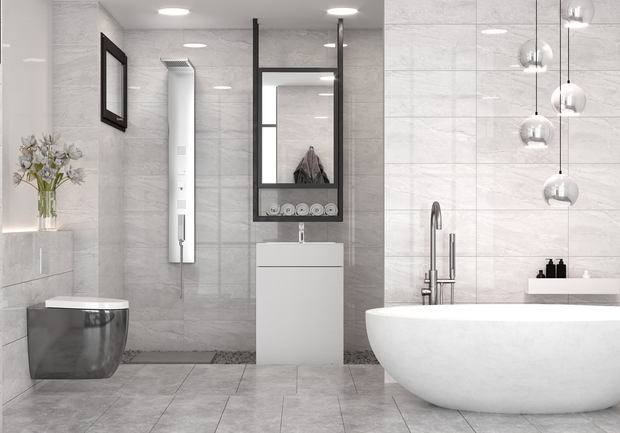
Unveiling Elegance: Choosing the Best Tiles for Your Bathroom
Introduction
Selecting the right type of tiles for your bathroom is a critical decision that not only influences the overall aesthetic but also plays a vital role in the functionality and maintenance of the space. With various materials, colors, and patterns available, it can be overwhelming to decide which tiles are best suited for your bathroom. In this comprehensive guide, we’ll explore different types of tiles and help you make an informed decision to create a stylish and functional bathroom.
The Importance of Choosing the Right Bathroom Tiles
Bathroom tiles serve both practical and aesthetic purposes. The right tiles can:
- Enhance Aesthetics: Tiles contribute significantly to the visual appeal of your bathroom. The right choice can create a cohesive and inviting atmosphere.
- Ensure Durability: Bathrooms are prone to moisture, heat, and frequent use. Durable tiles can withstand these conditions, ensuring longevity and minimizing maintenance.
- Facilitate Easy Cleaning: The bathroom is a high-traffic area, and tiles that are easy to clean and maintain contribute to a hygienic environment.
- Provide Safety: The right choice of tiles can enhance safety by offering slip-resistant surfaces, especially in wet areas like showers and tubs.
Types of Bathroom Tiles
1. Ceramic Tiles
Pros:
- Affordable and widely available.
- Durable and resistant to water, stains, and humidity.
- Easy to clean and maintain.
- Wide range of colors and patterns.
Cons:
- Not as durable as porcelain.
- Can chip or crack under heavy impact.
2. Porcelain Tiles
Pros:
- Extremely durable and resistant to wear and tear.
- Highly water-resistant.
- Versatile in design, mimicking natural stone or wood.
- Low maintenance and easy to clean.
Cons:
- More expensive than ceramic tiles.
- Harder to cut during installation.
3. Natural Stone Tiles
Pros:
- Unique and elegant appearance.
- Durable and long-lasting.
- Suitable for radiant heating systems.
- Adds value to the property.
Cons:
- Requires regular sealing to prevent stains.
- More expensive than ceramic or porcelain tiles.
- Some stones may be porous.
4. Glass Tiles
Pros:
- Reflects light, creating a bright and open feel.
- Resistant to stains and moisture.
- Easy to clean.
- Available in various colors and shapes.
Cons:
- Can be slippery when wet.
- May require more maintenance to prevent water spots.
5. Vinyl Tiles
Pros:
- Affordable and easy to install.
- Soft and warm underfoot.
- Resistant to water and stains.
- Available in a wide range of designs.
Cons:
- Less durable compared to ceramic or porcelain.
- Can be damaged by sharp objects.
- May show signs of wear over time.
6. Terracotta Tiles
Pros:
- Warm and rustic appearance.
- Natural and eco-friendly.
- Suitable for radiant heating systems.
Cons:
- Requires regular sealing to prevent stains.
- Susceptible to chips and cracks.
- Limited color options.
7. Mosaic Tiles
Pros:
- Offer intricate and customizable designs.
- Ideal for creating accent walls or borders.
- Suitable for curved surfaces.
- Can be made from various materials.
Cons:
- Grout lines may require more maintenance.
- Some designs may feel busy in larger spaces.
8. Large Format Tiles
Pros:
- Create a seamless and modern look.
- Fewer grout lines, making maintenance easier.
- Ideal for both floors and walls.
Cons:
- Requires a level and stable subfloor.
- Challenging to cut during installation.
9. Concrete Tiles
Pros:
- Modern and industrial appearance.
- Durable and resistant to water.
- Available in various colors and patterns.
Cons:
- Requires sealing to prevent stains.
- May develop hairline cracks over time.
10. Cork Tiles
Pros:
- Soft and comfortable underfoot.
- Insulating properties.
- Resistant to mold and mildew.
- Environmentally friendly.
Cons:
- Requires regular sealing.
- Prone to damage from sharp objects.
Frequently Asked Questions:
1. Which type of tile is best for a bathroom floor?
Porcelain tiles are an excellent choice for bathroom floors due to their durability, water resistance, and versatility in design.
2. Are natural stone tiles suitable for bathroom use?
Yes, natural stone tiles can be used in bathrooms, but they require regular sealing to prevent stains and may be more porous than other options.
3. Can glass tiles be used in shower areas?
Yes, glass tiles can be used in shower areas, but it’s important to choose slip-resistant varieties to enhance safety.
4. Do vinyl tiles look cheap in a bathroom?
No, vinyl tiles come in a variety of designs and can mimic the appearance of more expensive materials, offering an affordable and stylish option.
5. Are mosaic tiles hard to clean in a bathroom?
Mosaic tiles may have more grout lines, requiring a bit more maintenance. Regular cleaning and proper sealing can help prevent issues.
6. Can large format tiles be used on bathroom walls?
Yes, large format tiles can be used on bathroom walls to create a modern and seamless look, with fewer grout lines for easier maintenance.
7. Do concrete tiles crack easily in a bathroom?
Concrete tiles may develop hairline cracks over time, but proper installation and regular sealing can help minimize this issue.
8. Are cork tiles suitable for bathroom floors?
Cork tiles are suitable for bathroom floors due to their soft and comfortable feel, but they require regular sealing to prevent damage.
9. Do terracotta tiles work well in modern bathroom designs?
Terracotta tiles can work well in modern designs, providing a warm and rustic touch. Their suitability depends on the overall aesthetic you want to achieve.
10. Which tiles are best for a small bathroom to create the illusion of space?
Large format tiles with light colors can create the illusion of space in a small bathroom by reducing the number of grout lines and reflecting more light.
Conclusion
Choosing the best tiles for your bathroom involves considering both practical and aesthetic factors. While each type of tile comes with its own set of pros and cons, your decision should align with your preferences, budget, and the specific needs of your bathroom. Whether you opt for the durability of porcelain, the elegance of natural stone, or the affordability of vinyl, the right choice will contribute to a stylish and functional bathroom that suits your lifestyle. Explore different options, consult with professionals, and embark on the journey of transforming your bathroom into a space that reflects your unique taste and meets your practical requirements.

